|
|
|
Sort Order |
|
|
|
Items / Page
|
|
|
|
|
|
|
| Srl | Item |
| 1 |
ID:
113693
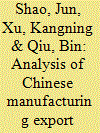

|
|
|
|
|
| Publication |
2012.
|
| Summary/Abstract |
This paper studies the duration of Chinese manufacturing exports and its determinants, using disaggregated 6-digit level Harmonized System product trade data from 1995 to 2007. Cox proportional hazard, Weibull and exponential models are used to examine the effects of various factors on export duration. It is revealed that export duration tends to be rather short-lived. It is also found that GDP and GDP per capita of the export destination have positive effects on export duration, while trade relationships with distant and landlocked countries are generally of shorter duration. In addition, export duration is longer for differentiated and parts and components products, as well as products with large initial trade values. WTO membership is also important for longer export duration. Our empirical analysis suggests that developed markets, such as the USA and the EU, are important to China, and should still be the major sources for Chinese export growth in the long run. Moreover, technical innovation of firms and free trade agreement negotiations will be helpful for sustainable export growth.
|
|
|
|
|
|
|
|
|
|
|
|
|
|
|
|
| 2 |
ID:
106058
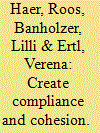

|
|
|
|
|
| Publication |
2011.
|
| Summary/Abstract |
Established conflict theories focus on the role of incentives in the decision to join, stay, or leave an insurgency. These theories, however, disregard the pressure that an organization can impose on its members. Similar to legal organizations, we assert that a rebel organization can sustain itself by effective human resource management. Using narratives resulting from psychological trauma therapy of former combatants of the Lord's Resistance Army (LRA), these management strategies are examined. The analysis shows that the LRA sustains itself in the first place by the use of brute force. However, they also manage themselves by a careful selection process of their fighters, by the conscious creation of social control, and by offering their members an alternative social network in which promotion and compensation play a role.
|
|
|
|
|
|
|
|
|
|
|
|
|
|
|
|
| 3 |
ID:
094690
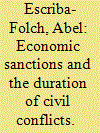

|
|
|
|
|
| Publication |
2010.
|
| Summary/Abstract |
This article studies the impact of economic sanctions on the duration and outcome of intrastate conflicts. Sanctions are argued to foster the convergence of beliefs over parties' capacity, to reduce the utility of victory and to increase the costs of continuing fighting. Using a sample of 87 wars and new data on sanctions and sanction types, the author shows that sanctions and their durations are statistically associated with shorter intrastate conflicts. It is also shown that total economic embargoes are the most effective type of coercive measure in these cases and that sanctions imposed either by international organizations or by other actors have similar negative effects on war duration. In the second part of the article, the dependent variable is disaggregated, and I demonstrate that sanctions imposed by international institutions increase the likelihood of conflict resolution, whereas those sanctions not imposed by such institutions tend to increase the probability of a military victory. Moreover, if the targeted state is a member of the international institution imposing the sanctions, the effect of such coercion is even greater. Economic embargoes are also proven to increase the likelihoods of a military and a negotiated end, whereas international arms embargoes reduce the likelihood of a military victory.
|
|
|
|
|
|
|
|
|
|
|
|
|
|
|
|
| 4 |
ID:
090998
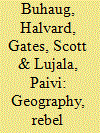

|
|
|
|
|
| Publication |
2009.
|
| Summary/Abstract |
Why do some armed civil conflicts last longer than others? Drawing on a contest success function model, we show that geographic factors (such as location, terrain, and natural resources) interact with rebel fighting capacity and together play a crucial role in determining the duration of conflict. Using precisely dated duration data in event history models and geographic data for the conflict location, we find that conflicts located at considerable distance from the main government stronghold, along remote international borders and in regions with valuable minerals last substantially longer. In addition, we find that rebel military capacity in its own right increases the prospects of a civil conflict ending within a short time period. Our findings imply that the distances an army must travel to project power, rebel fighting capacity, and characteristics of conflict region affect how a civil war is fought and who will prevail
|
|
|
|
|
|
|
|
|
|
|
|
|
|
|
|
| 5 |
ID:
133147
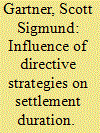

|
|
|
|
|
| Publication |
2014.
|
| Summary/Abstract |
Are Directive Strategies in international disputes the most effective mediation method for obtaining durable peace? A standard statistical analysis shows no effect of Directive Strategies on settlement durability. This result however, is misleading, failing to take selection and indirect effects into account. In this article, I identify when selection and process effects reinforce or oppose each other. Directive Strategies have opposing negative selection and positive process effects, which can distort inferences about their influence. Strategies' direct and indirect effects are also examined. Directive Strategies are more likely to lead to Full Settlements - the most comprehensive form of agreement, which improve the settlement durability (an indirect effect). However, Directive Strategies are used in more intractable disputes that result in fragile settlements (a direct effect). A statistical analysis of international disputes that takes these conflicting dynamics into account demonstrates the efficacy of Directive Mediation Strategies in producing durable agreements.
|
|
|
|
|
|
|
|
|
|
|
|
|
|
|
|
| 6 |
ID:
107662
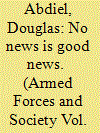

|
|
|
|
|
| Publication |
2011.
|
| Summary/Abstract |
The Australian government and military have maintained humanitarian interventions for far longer than any comparable U.S. humanitarian intervention. This longevity confounds most traditional international relations theories. It seems that the key variable is public support for humanitarian interventions. The U.S. public quickly grew impatient with humanitarian operations, while the Australian public has not yet done so. Two reasons for the Australian public's forbearance are explored. First, the idea that the Australian military and government are proficient at these operations and that the public supports these operations because it "loves a winner" is found wanting. Second, innate differences between the United States and Australia, particularly regarding news media, are explored; these differences seem to be highly correlated with the longevity of the operations. It seems likely that the Australian public does not hear enough about these operations to be concerned about them or question their utility, efficacy, or cost.
|
|
|
|
|
|
|
|
|
|
|
|
|
|
|
|
| 7 |
ID:
188825
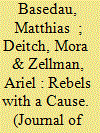

|
|
|
|
|
| Summary/Abstract |
Ideology may directly provide motive and indirectly capacity for collective violence, thus making armed conflicts longer and bloodier. We investigate these propositions by drawing on an innovative global dataset which codes ideological claims by rebel groups and governments in intrastate armed conflicts since 1946. Results demonstrate that although ideology increases conflict duration, these effects vary by type and timing. Whereas secular ideological conflicts tended to be more protracted during the Cold War, religious ideology has become increasingly important since. We, however, find little evidence that ideology increases conflict intensity. Rather, rebel criminality best accounts for intensity. So, while immaterial resources like ideology sustain willingness to fight, ideology’s influence upon conflict intensity is limited, especially after the Cold War. Future studies need to take ideology seriously and need to investigate its characteristics more in-depth and in conjunction with material, identity related and international variables.
|
|
|
|
|
|
|
|
|
|
|
|
|
|
|
|
| 8 |
ID:
178642
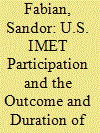

|
|
|
|
|
| Summary/Abstract |
The United States has provides international military education and training (U.S. IMET) to military personnel from more than 100 countries annually. In spite of this, the effects of such training have received limited study in international relations literature. This article explores how these programmes affect the outcome and duration of insurgencies. It theorises that military education and training received in the U.S. improves the human capital of recipient state militaries. This improvement makes the overall military forces of incumbent governments more capable and effective in their fights against insurgents, leading to increased probabilities of government victories. This analysis also argues that improvement in incumbent governments’ military capabilities incentivizes insurgents to disperse, hide, and not engage government forces in open battles, resulting in prolonged conflicts. The statistical analysis of a new, merged dataset including detailed information on insurgencies and U.S. IMET participation between 1976 and 2003 supports both arguments.
|
|
|
|
|
|
|
|
|
|
|
|
|
|
|
|
| 9 |
ID:
084551
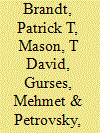

|
|
|
|
|
| Publication |
2008.
|
| Summary/Abstract |
Previous research has shown that the duration of a civil war is in part a function of how it ends: in government victory, rebel victory, or negotiated settlement. We present a model of how protagonists in a civil war choose to stop fighting. Hypotheses derived from this theory relate the duration of a civil war to its outcome as well as characteristics of the civil war and the civil war nation. Findings from a competing risk model reveal that the effects of predictors on duration vary according to whether the conflict ended in government victory, rebel victory, or negotiated settlement.
|
|
|
|
|
|
|
|
|
|
|
|
|
|
|
|
|
|
|
|
|